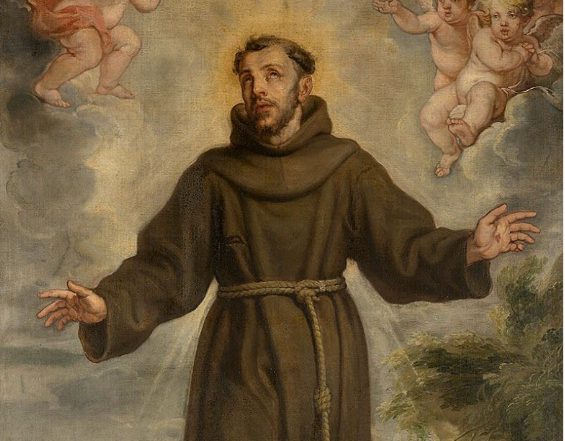Winner of the Spring 2019 StMU History Media Award for
Best Article in the Category of “People”
Francis was faced with a very large obstacle: while he was trying his hardest to pursue what he found to be his vocation, the hate that welled up in his father proved to be a major issue in his passage to that calling. Even though Francis knew without a doubt that he could easily become a very successful merchant, he felt an even stronger gravitation towards another life. Indeed, he felt called to a life that would constantly require to him to put the skills he gained from shadowing in his father’s work and provide him with an even stronger fulfillment in his life, despite it being very much against the social standards of his community and the wishes of his father. While his father saw his choice as an acceptance of failure, Francis saw it as an answer to the call of something greater than anyone could have ever imagined.
In Assisi, Italy, lived our character, Francis. Francis was born in 1182 to Pietro and Pica Bernardone. Throughout his childhood, Francis proved to be a very charming and popular young boy, as he was well liked by many children in his area, and was constantly followed by a group of friends. At home, Francis’ parents were very caring for him and constantly tended to all his wants and needs. His father was a very successful textile merchant, a career that made him and his family wealthy, while Francis’ mother stayed at home with him and did house work, including serving Francis, making him the center of her life, her pride and joy.1 Francis was well set with a large group of friends and two parents that loved to spoil him.2 When Francis was of age, he went to work with his father to learn the business of a merchant. Francis, as it turned out, was a natural, and caught on to the trade very well. After a short time, he began showing signs of a bright future as a textile merchant.
Merchants in Francis’ time were those that traveled long distances in order to exchange goods in various lands with various people. Textile merchants, the kind of merchant that Francis’ father was, tended to sell a great amount of goods and generally made very large amounts of revenue from their sales. Merchants were also well known for influencing the spread of culture and religion to those that they sold to, as they needed to be very persuasive in order to make sales, and were naturally found to do the same with their lifestyles. As a result, Francis quickly learned not only how to sell goods, but how to teach as well. The skill of spreading and teaching customs, language, and especially religion would greatly influence Francis’ future. His father had no idea that he was preparing his son for a future calling outside of textile trading.3
When Francis reached young adulthood, a war had sparked in his country, Assisi, and its neighboring city, Perugia. Francis was sent into the military to take part. On the battlefield, Francis observed firsthand the many horrors of battle, and was left with experiences that would haunt him for quite some time. Francis was not in a good mental state when he was sent home from his first tour, and sadly, he hardly had time to recover before he was sent to war a second time. The next time he came home, Francis’ behavior had taken a turn for the worst, as his memories had scarred him greatly. To attempt to rid himself of these scars, Francis tried to return to the life he had right before he first left home. In an attempt to adapt to civilian life, Francis ultimately found himself drinking heavily with his friends and was frequently surrounded by constant celebrations. In addition to his attempts to fuel his social life, he continued to live the life of good luxury in his home. All of his attempts, however, only numbed the pain for a very short time.4
Not long after returning to life in his town, Francis had fallen gravely ill. Eventually, when his state failed to improve, it seemed very likely that he would die from the illness that had caught hold of him. Francis was surrounded by distress and fear, and it seemed to him that there was nowhere to turn. With nowhere else to seek refuge, Francis began to turn towards his faith, which he had neglected through his life of luxury and celebration. He began to visit the local church daily to reflect and pray. He found a very strong devotion to Christ’s Passion, through the Stations of the Cross. This was a small conversion that would continue to influence Francis. After turning his face towards the church, Francis found himself healing from his great illness. In response, he began to devote more and more time to his spirituality within the church: he reflected daily on Christ’s Passion through the Stations of the Cross. His illness quickly forgotten, Christianity became the most important matter in Francis’ life. Unbeknownst to his community or himself, Francis was changing.5
His parents were the first to see the changes that Francis was going through, though they knew not what was going on in his life. All they noticed was that his mood, all of a sudden, had become withdrawn from others. After a while, they noticed that Francis was acting out of the ordinary, very unlike what they had always known him to be. Then, all together, without any warning, Francis simply left. Francis’ parents had no idea where he had gone or what he was up to.6
Francis had left his old life behind and began a new one. He took a vow of poverty. He no longer held a longing to have many material possessions or a large accumulation of wealth, things he was raised with. Instead, he began to focus all of his energy on teaching and preaching to others, using his skills that he had drawn from his merchant work with his father. He found that he loved to talk with his fellow brothers and sisters, and he wanted to bring them to a life dedicated to Christ. He even preached when there were no humans to preach to. Francis was known to preach to birds and other animals. He called them, too, his brothers and sisters, for he considered them to be part of God’s gifts in creation. This is the side of Francis that many Catholics would know him for as a saint, hundreds of years in the future.

Although Francis had found a path that he was truly happy to follow, his father did not share this same view. Francis’ father viewed his son’s decision as an embarrassment, since he had been raised in a place of high status. His father felt that Francis had thrown away everything that was handed to him, and tainted the family name. Soon, the frustrations of Francis’ father turned to hate and hostility, and Francis was no longer welcomed home. Despite all this, Francis continued on the path he vowed to follow.7
Despite the unfortunate circumstance with his father, Francis continued on his path of asceticism and growth of himself and others in Christ. The nature of his work ensured that Francis would travel to many areas, another lifestyle that he had grown accustomed to from his work as a merchant. Everywhere he went, he preached and began to accumulate followers. Pretty soon, Francis became a popular figurehead and was beloved by many, just as he had been as a boy. This time, however, it was by his work, not his wealth and social status, that he gained such immense popularity.
Francis saw that he had a large congregation of followers that loved his ways, so he decided to go to the Holy Father to establish a religious order after his teachings. He went with his most loyal followers and presented his request to Pope Innocent III. The order was denied at first, but after much convincing from Francis, Innocent III agreed and declared the order. Upon hearing this, Francis’ followers were overjoyed. Francis and his newly vowed religious brothers began to take on new assignments in order to guide others to Christ.8

Francis gave up everything in order to pursue his vocation in life. He abandoned the wealth and luxury that was readily available to him, and dedicated himself to a life that was so much more. Francis fought through the attitudes of his community and family alike, and stood by the life that he believed to be prosperous, going so far as to create an order that stands strong today. After his death, Francis was canonized on July 26, 1228, by Pope Gregory the IX. St. Francis is today one of the most beloved saints in the Catholic church and is often remembered for his many works and dedication to Christ and his people.9

- Paul Sabatier, The Road to Assisi (Massachusetts: Paraclete Press, 2003), 17-18. ↵
- Augustine Thompson, O.P., Francis of Assisi: A New Biography (New York: Cornell University Press, 2012), 8-9. ↵
- Paul Sabatier, The Road to Assisi (Massachusetts: Paraclete Press, 2003), 15-17. ↵
- Paul Sabatier, The Road to Assisi (Massachusetts: Paraclete Press, 2003), 19-20. ↵
- Augustine Thompson, O.P., Francis of Assisi: A New Biography (New York: Cornell University Press, 2012), 13. ↵
- Augustine Thompson, O.P., Francis of Assisi: A New Biography (New York: Cornell University Press, 2012), 14. ↵
- Paul Sabatier, The Road to Assisi (Massachusetts: Paraclete Press, 2003), 46-56. ↵
- Paul Sabatier, The Road to Assisi (Massachusetts: Paraclete Press, 2003), 64-67. ↵
- Paul Sabatier, The Road to Assisi (Massachusetts: Paraclete Press, 2003), 172. ↵



101 comments
Vivian Urrutia
I knew who St. Francis was but I didn’t knew well his entire story which I found so interesting. It is incredible how Francis decided to devote his whole life to the teachings of Jesus Christ by leaving his “old” life behind including his parents, his home, his wealthiness and his entire social life. What I thought about this article was how God permitted something bad like the disease he had to turn out to be something so good that will influence many people all around the world. Francis saw a purpose in his life and he strived to fulfill it, then, achieving it. I really liked this article and how he was described as a person.
Paula Salinas Gonzalez
This article is so informative. I was very surprised with how St. Francis turned his life around by turning away from alcoholism and embracing Christianity. It is also surprising how he turned down a life of luxury and comfort and chose to live a life of poverty. He gave everything he had up to follow God’s call and spread his teachings.
Azariel Del Carmen
I found his story to be rather interesting and aspiring. Not only did he change views to follow a path that his father disgraced him for taking despite his life being his, but he felt like he got everything right and made people fall more easily into the Christian faith wherever he went. His life in Assisi as a kid to sickness to now is something very interesting that I felt would have been alright in research but this raised my main more into him being of a interest topic.
Maria Moreno
Whenever I thought of St. Francis I thought of his selfishness and pureness because I knew he prayed with animals. Reading this was soothing in a way, it was a simple story, easy to comprehend and it makes a lot more sense summarized like this. It shows how when you follow your heart and do what you want no matter what other people think or what society will think, you will be happy. It must have been hard to leave his family behind and have his father’s rejection, but he was doing what made him truly happy and money doesn’t buy happiness
Eva Lizarraga
I had never really known the story of St. Francis, only that he was the patron saint of animals. This well-written article helped me understand a lot more of his journey, from the highs of his life like his childhood and later on religious teachings, to his lows such as his experience in the war and illness. He seemed to have faced many struggles but by following his heart and calling from God, was able to live a peaceful and meaningful life.
Roberto Macias-Marin
I love the story of Francis and his conversion story, it makes you realize that saints are in many occasions like us, regular people with aspirations and dreams. The openness of Francis in wanting to embrace the leper ultimately made him embrace the poor Christ and led him to founding the order of Friars Minor one of the most influencing orders in Catholicism and a vast amount of disciplines.
Eric Hernandez
This article is very interesting because I have heard so much about St. Francis and how he was very caring for the young and animals. Reading this story is really crazy seeing how he has changed from a higher status person, to giving up everything to follow God and also helping others to do so. This is a great example of how we should live as diciples
Davis Nickle
Francis definitely has to be one of my favorite saints. His origins have always been very interesting to me, and I found it very amazing that he was willing to give up his comfortable life in order to live one of prayer and poverty. I believe that he should be a model for how people who want to devote their entire lives to God. He truly was an extraordinary man.
Emmett Pena
St. Francis is such an inspiring figure, for all types of people wherever they are at in life. This article taught me more than what I already knew about Francis of Assisi, such as his partying lifestyle. To have a turning point like he did in his life is a true calling from God. This article has made me realize that God works in mysterious ways and the only way we’ll know if God is trying to tell us something is if we choose to listen to him.
Justine Ruiz
I found it quite interesting how St. Francis chose to give up his lavish life for something completely different. He didn’t listen to the backlash of his family and community because he truly believed that the vow of poverty was his calling. It makes us wonder, “If listening to our heart/gut is really worth the outcome?” St. Francis seemed to live a happy life with his true calling after deciding to follow his heart.